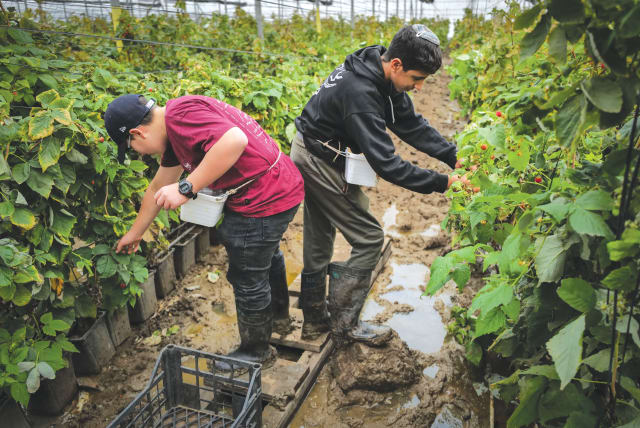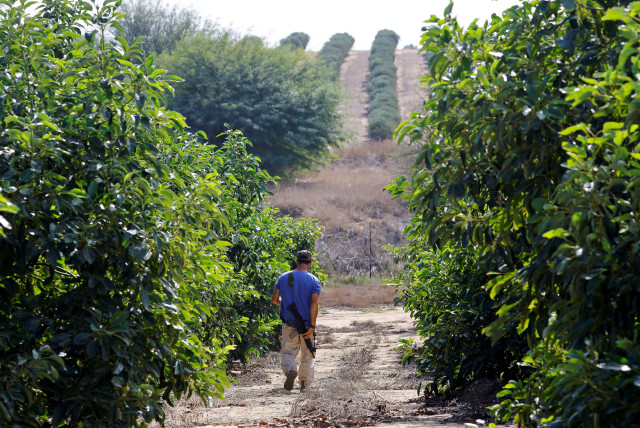War, Talmud, and agriculture - opinion

No one expects an unqualified yeshiva student to show up on the frontline and shed his blood. Instead, they could shed some sweat.
Variations on the words “unity” and “togetherness” have become common in Israeli discourse since October 7. The slogan “together we will win” is evident everywhere, although apparently not in ultra-orthodox neighborhoods, in which military service is negligible to non-existent. Nevertheless, politicians from that segment of the population draw on unity in their comments and interviews. I have recently seen such by Yitzchak Goldknopf and Arye Deri, leaders of Ashkenazi and Sephardi ultra-Orthodox parties, respectively.
Let me use this platform to suggest how they may express that very unity that they praise. My suggestion will enable them to generate goodwill among the general public, which at this time is doubly sensitive to unequal burden-sharing. This is not about large matters such as compulsory military service or the absence of basic schooling but about small things. How small? From an avocado to an orange, through a cucumber, and onto radishes.
It is no secret that the agricultural sector is in a severe crisis. Farmers and their laborers were murdered while others were evacuated; access to fields was limited by the army; and foreign workers have left. Volunteers attempt to fill this void. Young and old, they pick, pack, and prepare for the next cycle. They attempt to assist the landowners, both private and communal, while helping prevent a rise in the cost of living, which affects us all.
No one expects an unqualified yeshiva student to show up on the frontline and shed his blood. Instead, they could shed some sweat. About a third of some 30,000 foreign workers in the agricultural sector have left the country since October 7. There are about 150,000 full-time students in yeshivot. If they would each allocate one day a week, perhaps not all of them but most, even every fortnight, possibly only on Friday, which is a day off, they could fill the gap, at least until more workers arrive from abroad.
They would thus become a link in a historical chain of tillers of soil, headed by our patriarch Isaac, who sowed in Gerar (apparently between Netivot and Ofakim, not far from Gaza) and reaped a hundredfold. Archeology and our sources testify to our agrarian roots. True, there were limits on land ownership in the Diaspora. But the impression that our forefathers saw produce only in the market is wrong.
Yeshiva students can shed their sweat, while others shed their blood
Thus, in Hungary last century, my late grandfather owned a threshing machine, which supplemented his earnings as a Talmud teacher, and my late father subsidized his yeshiva studies by pressing grapes for wine. As an added value, such involvement would allow yeshiva students to understand the practical meaning of many agriculture-focused discussions that they see on the page.
They cannot be expected to be as proficient as professional laborers, and work would be adapted to the personal abilities of each one. True, such an enterprise would require a little slowing of their studies. In that, they would join all Israeli students who were called up on October 7 and those whose studies have been interrupted.
Initiatives along these lines, such as those of Karlin Hassidim, are to be applauded, but they are not enough. An extensive and systematic effort by the entire sector will prove to the Israeli public that among the ultra-orthodox and the politicians who represent them, unity is not a theoretical concept that applies to others but applies to them too, as part of the nation as it faces unprecedented challenges.
The writer was Israel’s first ambassador to the Baltic republics after the disintegration of the Soviet Union, ambassador to South Africa, and congressional liaison officer at the embassy in Washington. She is a graduate of Israel’s National Defense College.
Jerusalem Post Store
`; document.getElementById("linkPremium").innerHTML = cont; var divWithLink = document.getElementById("premium-link"); if (divWithLink !== null && divWithLink !== 'undefined') { divWithLink.style.border = "solid 1px #cb0f3e"; divWithLink.style.textAlign = "center"; divWithLink.style.marginBottom = "15px"; divWithLink.style.marginTop = "15px"; divWithLink.style.width = "100%"; divWithLink.style.backgroundColor = "#122952"; divWithLink.style.color = "#ffffff"; divWithLink.style.lineHeight = "1.5"; } } (function (v, i) { });

